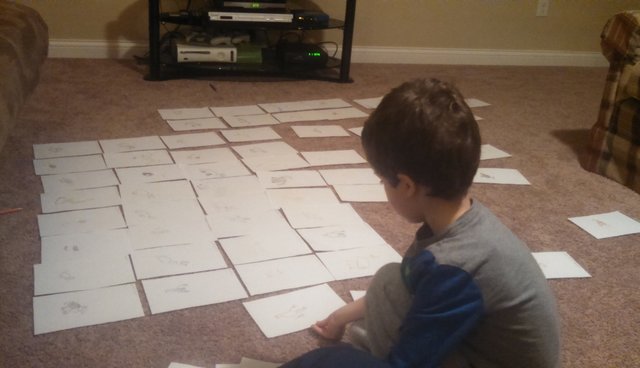
This week marks 10 years as a parent. Four kiddos and even another on the way. What a joy it’s been.
Having first experienced 30 random teenagers at a time, I became a parent with an abundance of curiosity. Observing day-to-day growth and development may have been more interesting to me than the average person. It’s been my own longitudinal psychology study. As a high school teacher and administrator, you see the full spectrum. Traits you’d wish to cultivate. Traits that you note are rare. Traits that you’d sell your own kidney to ensure your own child would avoid having. And, quite honestly, bad parent/child relationships I’d wish upon nobody.
On that note, I thought I’d share with you the Top 5 observations I’ve taken from my high school classroom and incorporated into my own parenting. Perhaps you have your own 🙂
1. Quality over Quickness
CLASSROOM LESSON – The race to be done. There’s no denying in our society this behavior is often rewarded. I WAS this kid. Second place is the first loser! Amirite? It doesn’t take long in a high school classroom before you value accuracy over speed, quality over quickness. (You can channel the quickness; see #2.)
AS A PARENT – There is “no rush” and “good work takes time.” This attitude attunes the kid to quality. Just a couple weeks ago after teaching my four-year-old’s Sunday School, I was not impressed with her scribble-scrabbly-ness so she could get extra “play time.” A couple days later, I had her pick out some coloring pages that she really liked. We put them in a new folder. We sharpened all of her colored pencils. Within just a few days, we saw an incredible improvement. She was carrying her coloring pages around for a couple days. I’m not sure it occurred to her that she COULD or SHOULD try to make the coloring page look nice before. Now she’s thinking about it.
Acknowledging incremental effort and quality increases is how you build a grinder. Just don’t overdo it – or that will make them feel satisfied.
2. The Value of Revision
CLASSROOM LESSON – Putting forth minimum effort to complete an assignment often feels like the only option. What’s done is done. Even when given opportunities to do corrections, many forego it. For me personally (and perhaps for you as well) this was inconceivable. More points! Why not? This is not how all kiddos are wired—thus how do you cultivate it? Countless high school folks wonder, Why do our students lack intrinsic motivation? Well, they never developed it.
AS A PARENT – We’ve emphasized revision. If a task is done, offer an idea that could make it EVEN BETTER. We are not Simon Cowells, but doing this helps our kids recognize that there’s always more that can be done. If you revise something, it will get better and better! With a story. With a picture. Eating their dinner. It’s always true.
In a similar vein, our kiddos have begun taking standard assessments. There’s only one piece of advice that I offer. “Make sure when you are done, if you have time, to go back and check your answers. It might feel like you take the test twice, but it’s worth it.” When they are less than 10 years old, they will often do whatever you (or another adult) tells them to do. In fact, they often soak it up. This is a surprising flexibility that a high school teacher very much appreciates.
3. Choices and Empowerment
CLASSROOM LESSON – Kids can be mean. Cruel even. We’ve all seen it. This isn’t news. Bullying behaviors pass from one kid to another. Eventually, it will get to your kid. What will they do? Who will they bully? I’ve always considered myself observant. In our neighborhood with a bunch of kids, I’ve watched how effectively kids have learned how to lie to their parents—who are oblivious. (Something I’m amused by from a history of parent-teacher conferences and shocking these sorts of parents with truth). Let me be clear, this is a learned behavior. Parents write this off as “kids being kids.” It might be the high school teacher advantage in me, because you when get lied to 100 times a day, you build a pretty effective radar.
AS A PARENT – From the age of one, we’ve been very intentional with including CHOICE in our language. “You need to make good choices.” “That’s a bad choice.” CHOICE. It’s a decision they are making. They can simply make another decision. They aren’t a good kid. They aren’t a bad kid. They are making choices. There’s something empowering about making choices.
Ten years in. We haven’t had a temper tantrum. Never had one of our kids hit another one. Never have had a screaming match. Never needed to “ground” a kid. No bullying behaviors. Only a couple of failed attempts at lying. In the rare case a line has been crossed, it gets crossed ONE time. It is handled instantly, directly, [loudly]—and the behavior doesn’t get repeated.
Stay tuned. We’ll see how they handle the 11-14 year old puberty-body-alien-abduction-rebel period.
4. Learning Taxonomy
CLASSROOM LESSON – Student learning and engagement can be undercut most quickly by one thing: vocabulary. This point was best illuminated for me when I was able to watch the best two teachers I’ve ever observed. One was a high school French teacher. The other was a third grade Spanish Immersion teacher. Teaching not just content, but language. How dynamic they were with visual cues and vocabulary reinforcement helped me understand what is missing for most struggling learners — particularly in a math classroom. They just don’t know what the heck is going on.
AS A PARENT – It became clear to me that building language in an organized way is key. It’s a good thing my wife has the librarian gene. All of our toys are organized and stay that way. The animal box. The car box. The guy box. The potato head box. Our two year old has taken to the animal box lately. We will set up a zoo. All of the bears will be together. All of the cat family will be together. All of the marsupials will be together. I think this type of learning taxonomy is key. If you learn a new thing but don’t have a place to put it, you won’t remember it. (Psychologists approve of this statement.)
Our 10 year old has a memory that has left myself and others flabbergasted. He could identify and talk to you about over 1,000 different animal species, 80% of the countries of the world, and many, many historical figures. (It doesn’t hurt that Dad has spent that last 10 years organizing math, science, social studies and ELA content into units and he’s been helping me from time to time.)
5. PBL happens at home too
CLASSROOM LESSON – A class immersed in a project of their own creation is a thing of beauty. Engagement, buy-in, retention, memorable experiences. It’s all there and we know it.
AS A PARENT – You can have these sorts of projects span months and even years. Years ago, with our then two year old, we recognized his interest in animals. He was distinguishing between the world’s eight different bear species fluidly. This led us to build a pretty extensive animal figure set and library.
It didn’t stop there. You can read more about this particular story here: LINK
With my then 6 year old, our family set off to create a wild animal conservation card game. Pick the animals. Research the species. Where do they live? Who can draw them? How do you publish a game? What else can we do with this art? How can we help more animals? Four years later we are still working on it. The Zoo Wild resources on our site are all fruits of this labor, but that’s just one product. I anticipate as our kids get older they will take this project in their own direction. Though it was an interest of our first born, this has trickled down through the rest of our kids. My wife and I have developed an expertise in our own right. All PBL.
We have similar projects with famous people (the Bio Sphere resources), landmarks (the Wonders resources), and warrior civilizations (the Warrior Class resources).
His 10th birthday present? Picking a city to fly to with me and planning 3 days of activities. We’ll see how that goes.
—-
I’ll update you in 10 years to let you know how it’s going 🙂


